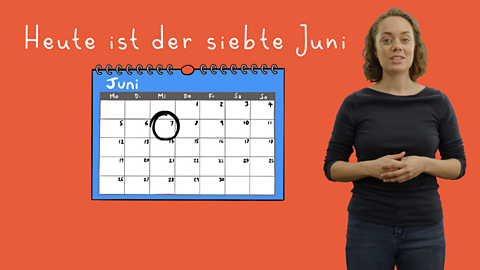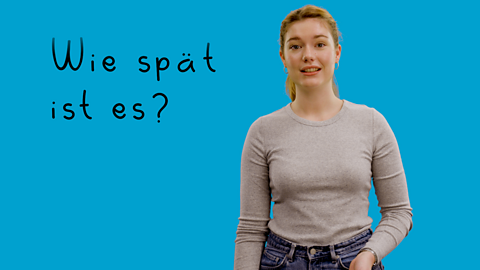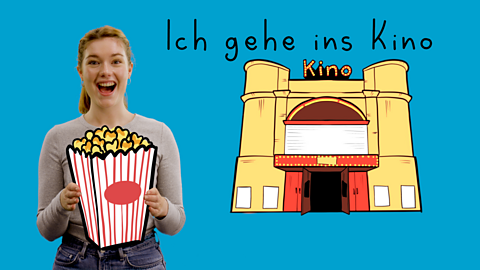Describing people in German
Have you met my friend, Tina?
Sie hat rote Haare und grĂĽne Augen. She has red hair and green eyes.
When describing people you can use the verb haben – to have:
ich habe - I have
sie hat - she has.
Ich habe braune Haare und blaue Augen - I have brown hair and blue eyes.
Sie hat Sommersprossen - She has freckles.
You can also talk about what people are like using sein - to be:
ich bin - I am
sie ist - she is
Ich bin klein - I am small.
Tina ist ˛µ°ů´ÇĂź - Tina is tall.
Sie ist ˛µ°ůöß±đ°ů als ich. - She’s taller than me.
Sie ist sportlich und stark. - She is sporty and strong.
Ich bin nicht so sportlich. - I’m not so sporty.
With sein - 'to be', and haben - to have, you can say a lot about yourself and other people.
Knowing some key verbs and interesting adjectives can help you describe someone’s appearance or personality.
There are two important verbs you can use to describe people: haben (to have)and sein (to be). Remember to conjugate the verb depending on whether you are describing yourself (ich) or someone else (er/sie).

Conjugate means changing the endings of a verb to match the person doing the action.
You can find the conjugations of haben and sein in the table below.
| haben | sein |
|---|---|
| ich habe - I have | ich bin - I am |
| du hast - you have | du bist - you are |
| er/sie/es hat - he/she/it has | er/sie/es ist - he/she/it is |
To say my when describing your friend or family member, use mein for males and meine for females.
Height
To describe how tall someone is, use sein (to be):
- Ich bin ˛µ°ů´ÇĂź - I am tall.
- Sie ist klein - She is short.
You can also add intensifiers to add more detail (sehr - very, ziemlich - quite):
- Ich bin sehr ˛µ°ů´ÇĂź - I am very tall.
- Meine Freundin ist ziemlich klein - My friend is quite short.

Hair
To describe someone’s hair, use haben (to have):
- Ich habe blonde Haare - I have blonde hair.
- Meine Freundin hat schwarze Haare - My friend has black hair.
- Mein Opa hat kurze, graue Haare - My grandad has short, grey hair.
- Sally hat lange, lockige, braune Haare - Sally has long, curly, brown hair.
| German | English |
|---|---|
| blonde Haare | blonde hair |
| braune Haare | brown hair |
| schwarze Haare | black hair |
| graue Haare | grey hair |
| rote Haare | red hair |
| lange Haare | long hair |
| kurze Haare | short hair |
| lockige Haare | curly hair |
| glatte Haare | straight hair |

Eyes
To describe someone’s eyes, use haben (to have):
- Ich habe blaue Augen - I have blue eyes.
- Mein Cousin hat braune Augen - My cousin has brown eyes.
| German | English |
|---|---|
| blaue Augen | blue eyes |
| braune Augen | brown eyes |
| grĂĽne Augen | green eyes |
| graue Augen | grey eyes |

Other features
You might want to describe other features too, like if someone has a beard or wears glasses.
You can use haben (to have):
- Mein Opa hat einen Bart - My grandad has a beard.
- Mein Onkel hat einen Schnurrbart - My uncle has a moustache.
- Meine Halbschwester hat Sommersprossen - My half-sister has freckles.
- Mein Stiefvater hat eine Glatze - My step-father is bald.
| German | English |
|---|---|
| der Bart | beard |
| der Schnurrbart | moustache |
| die Glatze | bald head |
| die Sommersprossen | freckles |


You can also use tragen (to wear). This verb is irregular with er, sie and es.
Add an umlaut to the a: er trägt.
- Ich trage eine Brille - I wear glasses.
- Sie trägt einen Hijab - She wears a hijab.
| German | English |
|---|---|
| ich trage | I wear |
| er/sie trägt | he/she wears |
| die Brille | glasses |
| einen Hijab | a hijab |

Activity
Read the descriptions below of Tom and Nat and complete the activity.
Tom: Ich habe lange braune Haare und blaue Augen.
Nat: Ich habe lockige blonde Haare und ich trage eine Brille.
Describing personality
There are lots of useful adjectives to describe someone’s personality. You need to use sein(to be) to talk about what someone is like:
Wie bist du? - What are you like?
Wie ist er/sie? - What is he/she like?
Ich bin lustig - I am funny.
Ich bin freundlich - I am friendly.
Using connectives
You can also add connectives (und - and, aber - but) and intensifiers (sehr - very, ziemlich - quite and nicht - not) to add more detail.
- Mein Freund ist nett und ´Ú±ô±đľ±Ăźľ±˛µ - My friend is nice and hardworking.
- Meine Oma ist sehr ruhig, aber intelligent - My granny is very quiet but intelligent.
- Mein Stiefvater ist sehr sympathisch und nicht faul - My step-father is very kind and not lazy.
Can you describe someone you know using the vocabulary below?
| German | English |
|---|---|
| lustig | funny |
| nett | nice |
| freundlich | friendly |
| sympathisch | kind |
| laut | loud |
| ruhig | quiet |
| faul | lazy |
| intelligent | intelligent |
| sportlich | sporty |
| kreativ | creative |
| streng | strict |
| ´Ú±ô±đľ±Ăźľ±˛µ | hardworking |
Comparing people
To compare people, use comparative adjectives. As is common in English, in German most adjectives just add -er on the end.
- Meine Mutter ist strenger als mein Vater - My mother is stricter than my father.
- Mein Bruder ist lustiger als meine Schwester - My brother is funnier than my sister.
There are some exceptions as some adjectives also add an umlaut when used in their comparative form.
- Mein Opa ist ˛µ°ůöß±đ°ů als meine Oma - My grandad is taller than my granny.
- Mein Vater ist ä±ôłŮ±đ°ů als meine Mutter - My father is older than my mother.
Mein Opa ist ˛µ°ůöß±đ°ů als meine Oma.
My grandad is taller than my granny.
Mein Vater ist ä±ôłŮ±đ°ů als meine Mutter.
My father is older than my mother.
Video
Watch this video then test your understanding of describing people in Spanish in the short quiz!
ANNA: Danke! Meine Schwester hat einen neuen Klassenkameraden. Er kommt aus Amerika. Hast du ihn gesehen?
CHRISTINA: Ich weiĂź nicht. Wie heiĂźt er?
ANNA: Er heiĂźt Leo
CHRISTINA: Wie sieht er aus?
ANNA: Er ist ˛µ°ů´ÇĂź. Er ist ˛µ°ůöß±đ°ů als ich.
CHRISTINA: Was fĂĽr Haare hat er?
ANNA: Er hat lange blonde Haare und braune Augen.
CHRISTINA: Ist er sportlich oder nicht?
ANNA: Er ist sportlich. Er spielt Basketball. Er kommt aus Amerika. Dort ist Basketball ganz beliebt.
CHRISTINA: Ist er auf Social Media?
ANNA: Ja. Hier ist er. Hier sieht er jĂĽnger aus.
CHRISTINA: Im Foto trägt er eine Brille.
ANNA: Also, kennst du ihn? Hast du ihn in der Schule gesehen?
CHRISTINA: Ich glaube nicht. Hat er Geschwister?
ANNA: Ja. Eine Schwester. Seiner schwhester ist auch sehr nett. Sie ist kleiner als er. Sie hat lockige Haare.
CHRISTINA: Ich glaube ich habe sie gesehen. Hat sie rote lockige Haare?
ANNA:Ja.
CHRISTINA: Hat sie Sommersprossen?
ANNA: Genau!
CHRISTINA: Ich kenne sie. Sie heiĂźt Katja. Sie spielt Gitarre.
ANNA: Ja. Also, Katja ist Leos Schwester.
Translation:
ANNA: Thanks! My sister has a new classmate. He comes from America. Have you seen him?
CHRISTINA: I don’t know. What’s his name?
ANNA: His name is Leo.
CHRISTINA: What does he look like?
ANNA: He is tall. He is taller than me.
CHRISTINA: What kind of hair does he have?
ANNA: He has long blonde hair and brown eyes.
CHRISTINA: Is he sporty or not?
ANNA: He is sporty. He plays Basketball. He comes from America. Basketball is very popular there.
CHRISTINA: Is he on social media?
ANNA: Yes, here he is. He looks younger.
CHRISTINA: In the photo he is wearing glasses.
ANNA: So, do you know him? Have you seen him in school?
CHRISTINA: I don’t think so. Has he got siblings?
ANNA: Yes, a sister. His sister is really nice too. She is shorter than him. She has curly hair.
CHRISTINA: I think I’ve seen her. Has she got red curly hair?
ANNA: Yes.
CHRISTINA: Has she got freckles?
ANNA: Exactly!
CHRISTINA: I know her. Her name is Katja. She plays guitar.
ANNA: Yes. So, Katja is Leo’s sister.
Quiz
Game - FestiLingo: German. game
Visit the festival and practise German language skills in this game

More on Topics
Find out more by working through a topic
- count4 of 9

- count5 of 9

- count6 of 9
